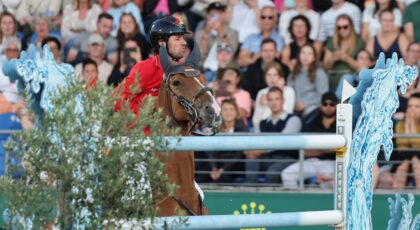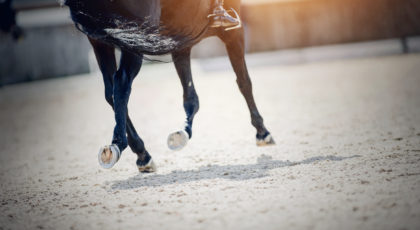There’s an old, well-known saying among seasoned trial lawyers: “Never ask a question you don’t know the answer to.”
For 15-time FEI World Cup Finalist Richard Spooner, riding, at its most critical moments, can also be a little bit like that.
Take the now-iconic video of Spooner riding Incento during the 2002 ATCO Power Queen Elizabeth Cup at Spruce Meadows. On a bending line into the triple combination, Incento miss-read the take-off spot, leaving on the half stride and crashing through the first jump in the combination—with two more obstacles in quick succession still to come.
As a rider, it was literally the worst position in which Spooner could have found himself. A lesser jockey might have frozen, bailed, or attempted to pull his horse out of the line.
Richard Spooner dropped his reins.
Because—just like a dyed-in-the-wool prosecutor—Spooner knew he wasn’t going to ask his horse to try something when he himself didn’t know the answer to what was going to happen. What he did know is that his horse might need to use his head and neck in order to balance and save them both, and he needed the freedom to do so.
“Just like three-day eventing, when it all goes askew, when it goes sideways, your main thing is your balance and getting in the back of the tack,” Spooner explained. “So, at that point, if you really have no clue what the horse is going to do, then you shouldn’t be telling it what to do.
“When you get to a point where it’s like, No, no, no, I cannot possibly guess what this horse is going to do, this is beyond… you basically [have to] just look in the middle of the horse and play it out.”
Play it out, Spooner did, sitting chilly and trusting in his horse to make the right call. Ironically, not only did Incento right the ship, he even jumped out of the ‘c’-element of the triple without touching a single pole.
For his part, all these years later, Spooner can’t see what all the fuss was about, casually referring to that day’s events as “normal operating procedure” and “nothing special.” For the other 99% of us, however, Spooner’s reaction seems both surreal and counter intuitive.
Or, as one video commentator described it, “It goes against your natural instincts, like driving on ice. He did the right thing; he survived to ride another day.”
And whether fighting the urge to brake on black ice or micromanage your horse in a potentially dangerous situation, the ability to act with your head while resisting your baser instincts takes a special brand of self-control.
“I’ve always been, just for whatever reason, the type of person that when things get really serious, I get very calm,” Spooner said.
The California transplant now based in Ocala, Florida stresses that remaining calm isn’t the same as not caring. “Sometimes it’s bad because the people around you think [that] you don’t care, [or] that you’re not emotional about what’s going on. I am emotional, but I worked really hard to [learn to] stay objective, and not to be emotional,” he added.
“Really, it’s not anything more than a training response.”
More than two decades later, in fact, Spooner is still surprised that his Maverick-level cool performance at Spruce Meadows that day—which has since been honored in more than one “greatest equestrian saves” list—still generates such a buzz.
“I don’t know, [I] was more embarrassed by that, funny enough,” the ever-modest Spooner admitted. “The fact that it took on a life of its own [the way it did has] always been kind of baffling.”


 April 17, 2025
April 17, 2025 
























